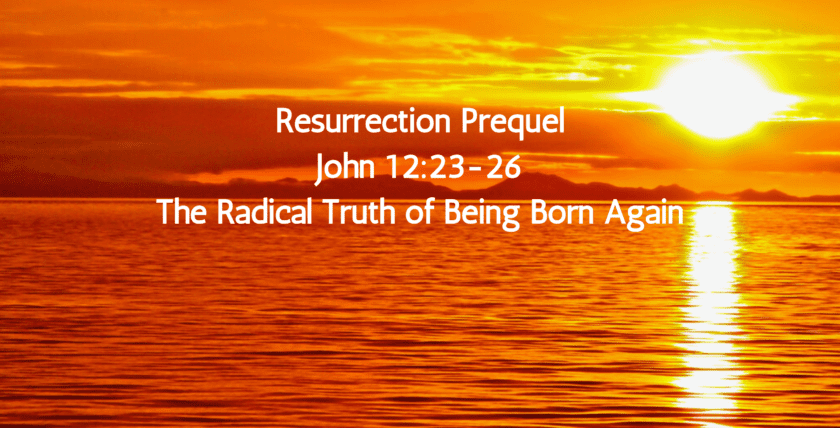Episode 2 – Since You first believed
There are things that happened to us as believers since we first believed that often go unrecognized. I want to talk about three things that happen to believers the moment they first believe. Understanding these three gifts given to every believer by the Father from the beginning of our walk with Christ is critical to our spiritual growth. To introduce these three gifts I want to introduce a spiritual paradox to you. By understanding this spiritual paradox is a way of demonstrating the difference between what is spiritually organic and non-organic.
A paradox is a self-contradictory statement that when explained may prove to be true. An example of a simple paradox is the statement, “Less is more”. On the surface it appears this statement is contradictory. How can less be more? But if we explain that less clutter in a room can make a room more appealing, we can see that less is more.
Paul gives us a spiritual paradox in 1 Corinthians 1:25-31. God chose to use the foolish, weak, and humble things of this world to confound the wise, strong, and powerful of this world. God chose to use things that appear to be nothing to make nothing of that are something. God initiated this spiritual paradox so humanity would abandon the notion that they could save themselves by their own efforts.
Paul didn’t say there weren’t “any” wise or powerful or noble, who believe In Jesus, just there aren’t very many. Paul also clarifies his statement about the wise and powerful and noble being according to worldly standards. Paul makes a distinction is a between the spiritual standards of the kingdom of heaven, and the physical standards of the kingdom of this world. So when I speak of Organic Spiritual growth or an organic church, it would be Organic to spiritual standards, and non-organic to the spiritual standard, but organic to the physical standards of this world.
God chose the ones (as in people) or the things that are nothing, to bring to nothing the ones (people) or things that are something. We can figure out to choose the people who appear as nothing to put the people who appear to be something to nothing. Jesus fits that definition. Can anything good come from Nazareth? A simple carpenter or blue-collar fisherman, rather than a Jewish religious theologian or Priest. A small shepherd boy like David rather than a mighty king. A simple country girl like Mary rather than a wealthy princess. An old desert sheepherder like Moses rather than a young valiant Egyptian prince.
We can figure the people thing out, but what about the “things” that are nothing. What are those These are things like faith, forgiveness, mercy, sacrifice, redemption, prayer, forbearance, perseverance, patience, humility, grace, trust, love, and hope. These are things that only exist as words. They are concepts and ideas. To the worldly these things are nothing, but in the Spiritual world, the kingdom of heaven, they are everything.
I remember many business meetings where we had situations that required a plan to fix something that went wrong. And when someone was asked to describe how they were going to fix the problem, if they started with “I hope…” they were immediately chastised and told, “You don’t hope you do.” In the business world, Hope is a 4-letter word.
What about the popular phrase in the world today, “Trust but verify.” If you verify then you don’t need trust. Trust is trust. You trust or don’t trust. It’s like saying, “I believe you, but prove it to me.”
The Spiritual standards of the kingdom of heaven are the Organic values of those who believe and trust in the things that are not. Hebrews 11:1 defines faith as the assurance of things hoped for, which aren’t seen. Things not seen are things that are not. Hebrews 11:2 says that those who lived their lives by faith and hope were commended by God. These people lived organic spiritual lives.
It isn’t about being the smartest, the most charismatic, or the most dynamic speaker, or having the largest congregation, or the most entertaining programs, or the largest church campus. It’s about being chosen by God, persevering in his plan for our redemption, trusting that you are the church and in the body of Jesus Christ, and having faith that God will make you and me into the image of Christ. On a macro level, that is organic spiritual living. Now let’s get down to the micro levels.
There are 3 takeaways I’m going to give you in this message from our series entitled; My Organic Spiritual Life.
1. You were given a message to communicate with others.
2. You were given hope in a promise.
3. You were given a community for support.
Takeaway #1 – Given a Message to Communicate
Since we believed, God gave us a message. We have a service to communicate that message to others. How do we do that? How do we tell people about Jesus? Do we communicate that message Organically or Non-Organically? Spiritually or Worldly? Again, Non-Organic or Worldly methods of communication is using what the world values to be effective as opposed to what the Father values.
Paul describes the process of communicating the message we’ve been given to communicate to others in Romans 10:13-18. Paul asks 3 Questions in this passage;
- How will they call on him in whom they have not believed?
- How can they believe in him whom they have never heard?
- How can they hear without someone preaching?
Paul gives us 3 answers to his questions;
- Someone preaches the Gospel.
- Someone hears and has faith to believe the Gospel.
- Someone calls on Jesus for salvation.
What is the worldly, non-organic method of communicating the Gospel we’ve been given? Using entertaining productions, popular speakers, famous endorsements, promises of wealth, and superpowers (i.e. spiritual gifts).
I just saw an advertisement from a religious group reaching out to inner-city gang members, runaways, and misunderstood and homeless teens. The slogan for the campaign was “Jesus was wrongly judged also.” This ad campaign is an effort to rebrand Jesus as someone who can sympathize with the youth of today because he was also misjudged. Is that the Gospel message, Jesus died because he was wrongly judged? Jesus died as a sacrifice for sin. He wasn’t wrongly judged by those who had him arrested. They judged him properly. Jesus will one day bring down the kingdom of this world and establish God’s kingdom forever. The hook for this $100M ad blitz is, “He gets you”. Jesus gets you, really? Isn’t the purpose of communicating the Gospel to others so the world “gets” Jesus?
Takeaway #2 – Given Hope in a Promise
- We received forgiveness by God’s Grace
- The forgiveness of all our sins (Acts 10:43)
- We received eternal life and salvation
- Not perish (John 3:16)
- Salvation (Romans 10:8-9)
- We received the Spirit of Christ
- Sealed us with the Spirit in our hearts (2 Corinthians 1:18-22)
- We received oneness with the Body of Christ – The Church
- One Spirit, Body, hope, Lord, faith, and baptism (1 Corinthians 12:13, Ephesians 4:4-5, 1 Corinthians 12:27)
- We received citizenship in heaven
- Belong in heaven (Ephesians 2:19-22)
The church isn’t brick, steel, and concrete, The church is flesh, blood, and Spirit. These “things” which are of no regard to the world, are what we have been given by our Father through his Spirit. These aren’t “Spiritual Gifts”, but rather they are “Gifts of the Spirit”, or better translated, they are “things the Spirit does”.
What does the Organic world give us? Judgment, death, hatred, isolation, prejudice, emptiness, or as Solomon said in Ecclesiastes; emptiness upon emptiness.
Takeaway #3 – Given a Community of Believers
God gave us a community of “called out ones” who believe in the Gospel message of Jesus Christ. It isn’t about joining a church. God has placed us in his church, which is the body of his son, Jesus Christ.
Rather than focusing on ad campaigns, politics, influence, favor, empathy, and membership numbers, Paul tells us in 1 Corinthians 14:1-3 that the Body of Christ should be focusing on the following 3 things;
- Edification; building up – teaching, fellowship
- Encouragement; implore, rally, exhort – songs, fun, pep talk, preaching
- Consolation; comfort – counseling, prayer, ministry
These 3 area’s of focus are expressed most effectively through;
- Fellowship – to be one with each other in fellowship
- Teaching – building up one another through teaching
- Ministry – serving one another as the Spirit reveals the needs
- Prayer/Counsel – ask and you will receive, seek and you will find
- Support – encouraging others out of an abundance of the love of Christ
Conclusion: In the next week use this message about the gifts you were given since you first believed by, 1) telling someone about Jesus Christ, 2) reading Hebrews 11:1-12:2 and letting the word speak to your mind and heart through the Spirit, and 3) be the Body of Christ to someone by building them up, exhorting them, or ministering to them in Christ.
May God’s Word and Spirit bless you and enlighten you always!
Leave your comments or ask questions below.


